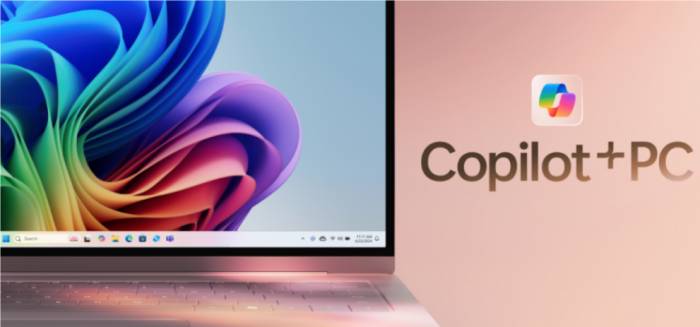Pacific Time, May 21, 2024, Microsoft held the Build Developer Conference in Seattle, USA, focusing on AI PC, Copilot, small language models, data and analysis, and other fields to launch a number of technological innovations.
Below, DeepTech will introduce each of the most concerned technologies one by one.
Copilot+PC: Transforming the PC industry with AI
Facing the development wave of generative AI, Microsoft has been committed to redesigning Windows PCs since 2023, and at this conference, the company launched a Windows PC category called "Copilot+PC".It is understood that every layer of this PC product has the presence of AI, hence it is acclaimed as "the fastest and smartest Windows PC ever" [1].
Specifically, it is equipped with a PC neural processing unit, and the processor's computing power exceeds 40 trillion operations per second; in terms of running AI workloads, the performance and efficiency are respectively 20 and 100 times higher than traditional PCs.
This new type of Windows PC is scheduled to hit the market in June 2024, initially equipped with Qualcomm Snapdragon X series processors, and then Microsoft will launch more such devices based on Intel and AMD.
In addition, it is worth mentioning that Microsoft has also released many powerful features of Windows, hoping to provide more software tools for developers in the AI transformation era, thus meeting their various development needs.Team Copilot: Extending the Capabilities of Copilot to Organizations
Advertisement
Nowadays, Copilot has made significant contributions to helping individuals improve productivity. To further unlock its business value, at this conference, Microsoft has introduced a new set of features based on this product.
Firstly, the launch of Team Copilot extends the capabilities of Copilot beyond personal assistants, enabling it to participate in organizational work, thereby helping teams to enhance work efficiency and collaboration.
For instance, it can take on roles such as project managers and be utilized in any collaborative environment like Microsoft Teams, Microsoft Loop, etc.
Secondly, custom Copilots can be built, capable of independently completing numerous work tasks. These include executing automated long-running business processes, learning from user feedback, logging exceptional requests, and seeking assistance, among others.Finally, the introduction of Copilot extensions and Copilot connectors not only helps users to obtain applications within their own business systems but also facilitates developers to create Copilot extensions more quickly.
Multimodal Small Model Phi-3-vision: Equipped with Language and Visual Functions
The Phi-3 series models, including Phi-3-mini, Phi-3-small, and Phi-3-medium, are small language models launched by Microsoft a few months ago.
Now, the model family has welcomed a new multimodal model with 4.2 billion parameters, Phi-3-vision. In terms of functionality, this model combines language and visual functions, capable of reasoning about images, extracting and reasoning text from images, generating insights based on charts, and answering questions, etc.For the Phi-3 series models, after undergoing benchmark tests in language, reasoning, mathematics, coding, and more, its performance can surpass models of the same scale or even larger. And the newly released Phi-3-vision is no exception.
According to the evaluation results provided by Microsoft, it excels in general visual reasoning tasks, optical character recognition, and understanding tasks of tables and charts, compared to larger models such as Claude-3 Haiku, Gemini 1.0 Pro V, and others.
It is clear that the continuous enrichment of the Phi-3 model family provides more options for Microsoft Azure customers to develop generative AI applications.
Small Language Model Phi-Silica: Specifically built for the neural processing unit in Copilot+PC.Not only that, but Microsoft has also launched a small language model called Phi-Silica, with 3.3 billion parameters, specifically built for the neural processing unit on "Copilot+PC".

According to the company, this model will not consume a lot of resources and can fully unleash the PC's CPU and GPU to perform other computing tasks.
A Microsoft spokesperson told the media: "The uniqueness of Phi-3-Silica lies in the fact that it is the first locally deployed language model for Windows, optimized for the neural processing unit of 'Copilot+PC', thus bringing lightning-fast local inference speed to the device[2]."
Introducing real-time intelligence into Microsoft Fabric to help businesses make wiser decisions and actions.In the era of AI, the reality of a data-driven world has already come into being. With this comes the necessity for businesses from all walks of life to increase the speed and accuracy of their operations in order to better upgrade their business models, meet customer needs, and thus achieve cost reduction and revenue enhancement.
Based on this, at this conference, Microsoft announced the introduction of real-time intelligence as a workload in Microsoft Fabric.
Real-time intelligence combines the best features of Synapse real-time analysis and Data Activator, along with a series of preview features, which can help businesses make wiser decisions based on the latest insights.
Specifically, by providing a complete end-to-end solution for data collection, processing, analysis, visualization, monitoring, early warning, and action taking for events, users can quickly and easily build solutions that provide valuable insights and early warnings, and achieve real-time operational orchestration.
As of now, the Build 2024 developer conference is still in progress, and those interested can watch it online on the official conference website.
